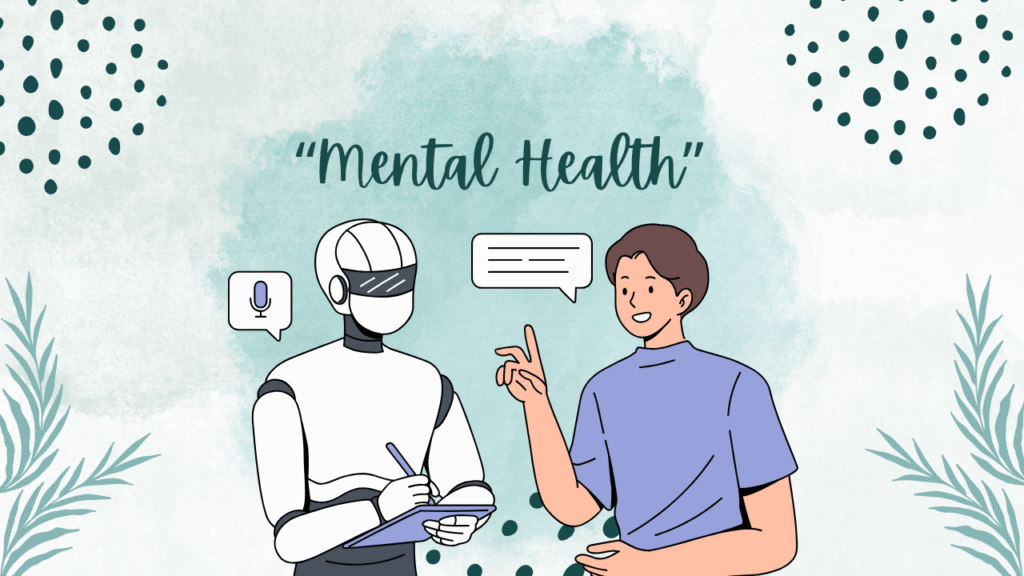Artificial intelligence is rapidly reshaping the way we think about emotional well-being and cognitive care. With advances in machine learning, natural language processing, and neuroscience, AI in mental health is no longer a futuristic concept. Instead, it is becoming an active part of therapy sessions, early intervention tools, and daily wellness practices. This shift opens the door to improved accessibility, personalized care, and more efficient treatment options.
Current State of AI in Mental Health
AI in mental health is already present in multiple forms. Popular mobile apps like Woebot, Wysa, and Replika use conversational AI to provide emotional support. Clinical trials have shown that AI-driven programs can detect signs of depression and anxiety earlier than traditional assessments. Virtual therapists, available 24/7, reduce barriers to seeking help and provide a safe space for people who might feel hesitant to talk to a human therapist.
Advancements in AI for Early Detection
One of the most promising applications of AI in mental health is early detection. Machine learning models can analyze subtle changes in speech patterns, facial expressions, and text messages to detect signs of mental distress.
- Speech and text analysis can reveal shifts in tone, pacing, and vocabulary linked to depression or anxiety.
- Wearable devices can track heart rate variability, sleep quality, and activity levels, identifying early indicators of burnout or cognitive decline.
These systems enable professionals to intervene before a condition worsens, potentially saving lives.
AI in Personalized Treatment Plans
AI in mental health offers more than diagnosis—it plays a key role in crafting personalized treatment plans. Algorithms can recommend therapy methods tailored to an individual’s needs based on continuous feedback and progress tracking.
- Adaptive therapy recommendations adjust to a patient’s emotional and cognitive changes.
- AI-assisted medication management helps determine optimal dosages, reducing side effects.
- Cultural and linguistic adaptation ensures therapies resonate with diverse populations.
This personalized approach bridges gaps in care, especially for individuals in underserved communities.
AI in Cognitive Well-Being Enhancement
Beyond clinical treatment, AI in mental health also focuses on cognitive well-being enhancement.
- Brain-training and neurofeedback systems strengthen memory, attention, and problem-solving abilities.
- AI-guided mindfulness tools adapt meditation sessions in real time based on biometric feedback.
- Personalized mental fitness programs adjust difficulty and content to keep the brain challenged and engaged.
These tools are particularly useful for older adults looking to maintain cognitive agility or individuals recovering from brain injuries.
Remote Mental Health Support
Teletherapy integrated with AI in mental health has revolutionized accessibility.
- AI-driven analytics assist therapists by highlighting patient mood changes between sessions.
- AI chat assistants provide emotional support during off-hours, preventing feelings of isolation.
- The combination of video calls and AI insights overcomes barriers related to location, cost, and stigma.
This approach ensures that mental health care is available to anyone with an internet connection.
Integration with Wearables and IoT
The integration of AI in mental health with wearable devices and IoT offers continuous monitoring and proactive care.
- Biosensors track mood-related biomarkers such as cortisol levels.
- Cognitive performance monitoring detects early signs of brain fatigue or attention lapses.
- Predictive alerts can warn caregivers and patients about potential crises before they occur.
This real-time data can inform both immediate interventions and long-term health strategies.
Ethical Considerations and Data Privacy
The rise of AI in mental health brings significant ethical questions. Protecting patient confidentiality is paramount, especially as these systems process deeply personal information. Risks include:
- Algorithmic bias, which can lead to misdiagnosis for certain demographic groups.
- Lack of transparency in how AI models make decisions.
- Informed consent challenges when users do not fully understand how their data is used.
Strict guidelines, encryption, and regular auditing are necessary to build trust.
Challenges in AI Adoption
Despite its potential, AI in mental health faces hurdles:
- Public trust remains a challenge, as many still prefer human-to-human therapy.
- AI’s understanding of complex human emotions is limited. Sarcasm, cultural context, and subtle non-verbal cues can be missed.
- Regulatory barriers and a lack of global standards slow widespread implementation.
Addressing these challenges will require collaboration between technologists, healthcare providers, and policymakers.
Future Trends and Innovations
The future of AI in mental health will likely include:
- Human-AI collaboration, where AI supports rather than replaces therapists.
- Advances in emotion AI and affective computing that can read micro-expressions and voice inflections more accurately.
- Cross-disciplinary collaborations between neuroscientists, psychologists, and engineers to create more effective tools.
These trends point toward a hybrid model where technology enhances the human touch rather than eliminating it.
Potential Global Impact
If implemented thoughtfully, AI in mental health could have a profound impact:
- Expanding access to care in rural and low-income regions.
- Detecting and preventing suicide through continuous monitoring and early alerts.
- Promoting proactive mental wellness by encouraging daily emotional check-ins.
This technology could help reduce global mental health disparities.
Conclusion
The evolution of AI in mental health represents both opportunity and responsibility. While AI can improve detection, personalize treatment, and support cognitive well-being, it must be developed and used with ethical care. By blending advanced technology with human empathy, we can create a future where mental wellness is more accessible, proactive, and inclusive.

